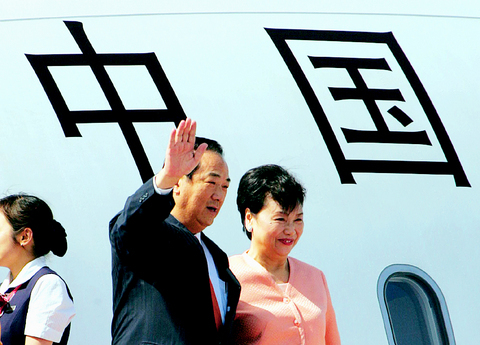Speaking in Xian on the first day of his trip to China, People First Party (PFP) Chairman James Soong (宋楚瑜) said that he was moved to finally be able to set foot on the other side of the Taiwan Strait.
"Everyone knows that the Strait between the two shores is only 100-odd kilometers wide, but it is moving for myself and [Chen] Wan-shui [陳萬水, Soong's wife] that it took us more than 50 years to cross the very narrow divide that is the Taiwan Strait," Soong said after arriving in Xian yesterday afternoon.
He was greeted at the airport by Beijing's Taiwan Affairs Office director Chen Yunlin (

PHOTO: AP
Speaking at Xian's airport upon arrival, Soong talked of his hopes for the trip and emphasized the "similar interests" shared by citizens of China and Taiwan as "common descendants of Yan Di."
Legend says that Yan Di was the father of Chinese agriculture and one of the first ancestors of the "Chinese people."
"I chose Xian as our first stop in China for two reasons. First, to look for the origin of our bloodline, and second, to build a bridge to the future," Soong said.
All Taiwanese, whether they are Hakka, Mainlander or Hoklo, trace their bloodlines to China, and thus were all Chinese people, he said.
In a play on words, Soong said that he hoped his journey would establish a "fourth direct link" -- a connection between the spirits of all "descendants of Yan Di."
"Many supporters asked me whether or not I would be able to facilitate the establishment of the `three direct links.' I've told them it is more important that I establish the `fourth link,' the link between the spirits on both sides of the Taiwan Strait," Soong said.
After visiting the Huangdi Mausoleum today, Soong is scheduled to fly to Nanjing.

The US government has signed defense cooperation agreements with Japan and the Philippines to boost the deterrence capabilities of countries in the first island chain, a report by the National Security Bureau (NSB) showed. The main countries on the first island chain include the two nations and Taiwan. The bureau is to present the report at a meeting of the legislature’s Foreign Affairs and National Defense Committee tomorrow. The US military has deployed Typhon missile systems to Japan’s Yamaguchi Prefecture and Zambales province in the Philippines during their joint military exercises. It has also installed NMESIS anti-ship systems in Japan’s Okinawa

‘WIN-WIN’: The Philippines, and central and eastern European countries are important potential drone cooperation partners, Minister of Foreign Affairs Lin Chia-lung said Minister of Foreign Affairs Lin Chia-lung (林佳龍) in an interview published yesterday confirmed that there are joint ventures between Taiwan and Poland in the drone industry. Lin made the remark in an exclusive interview with the Chinese-language Liberty Times (the Taipei Times’ sister paper). The government-backed Taiwan Excellence Drone International Business Opportunities Alliance and the Polish Chamber of Unmanned Systems on Wednesday last week signed a memorandum of understanding in Poland to develop a “non-China” supply chain for drones and work together on key technologies. Asked if Taiwan prioritized Poland among central and eastern European countries in drone collaboration, Lin

NO CONFIDENCE MOTION? The premier said that being toppled by the legislature for defending the Constitution would be a democratic badge of honor for him Premier Cho Jung-tai (卓榮泰) yesterday announced that the Cabinet would not countersign the amendments to the local revenue-sharing law passed by the Legislative Yuan last month. Cho said the decision not to countersign the amendments to the Act Governing the Allocation of Government Revenues and Expenditures (財政收支劃分法) was made in accordance with the Constitution. “The decision aims to safeguard our Constitution,” he said. The Constitution stipulates the president shall, in accordance with law, promulgate laws and issue mandates with the countersignature of the head of the Executive Yuan, or with the countersignatures of both the head of the Executive Yuan and ministers or

Renewed border fighting between Thailand and Cambodia showed no signs of abating yesterday, leaving hundreds of thousands of displaced people in both countries living in strained conditions as more flooded into temporary shelters. Reporters on the Thai side of the border heard sounds of outgoing, indirect fire yesterday. About 400,000 people have been evacuated from affected areas in Thailand and about 700 schools closed while fighting was ongoing in four border provinces, said Thai Rear Admiral Surasant Kongsiri, a spokesman for the military. Cambodia evacuated more than 127,000 villagers and closed hundreds of schools, the Thai Ministry of Defense said. Thailand’s military announced that